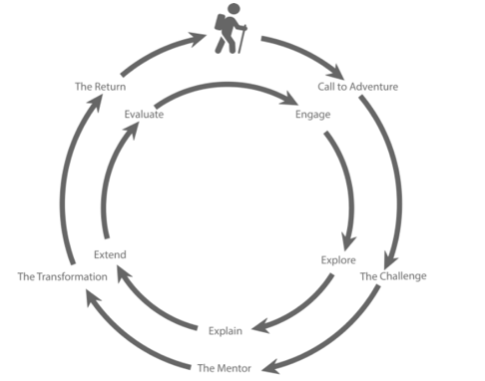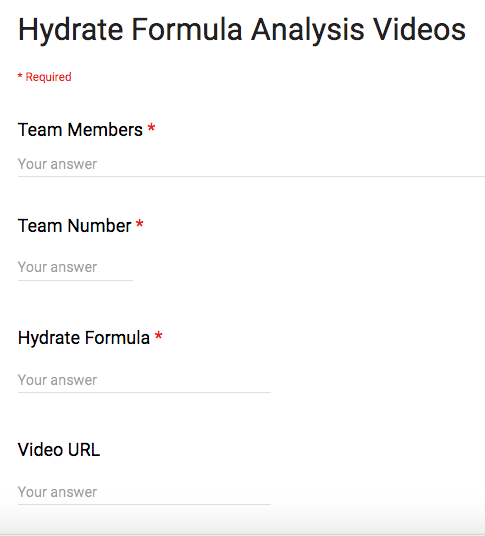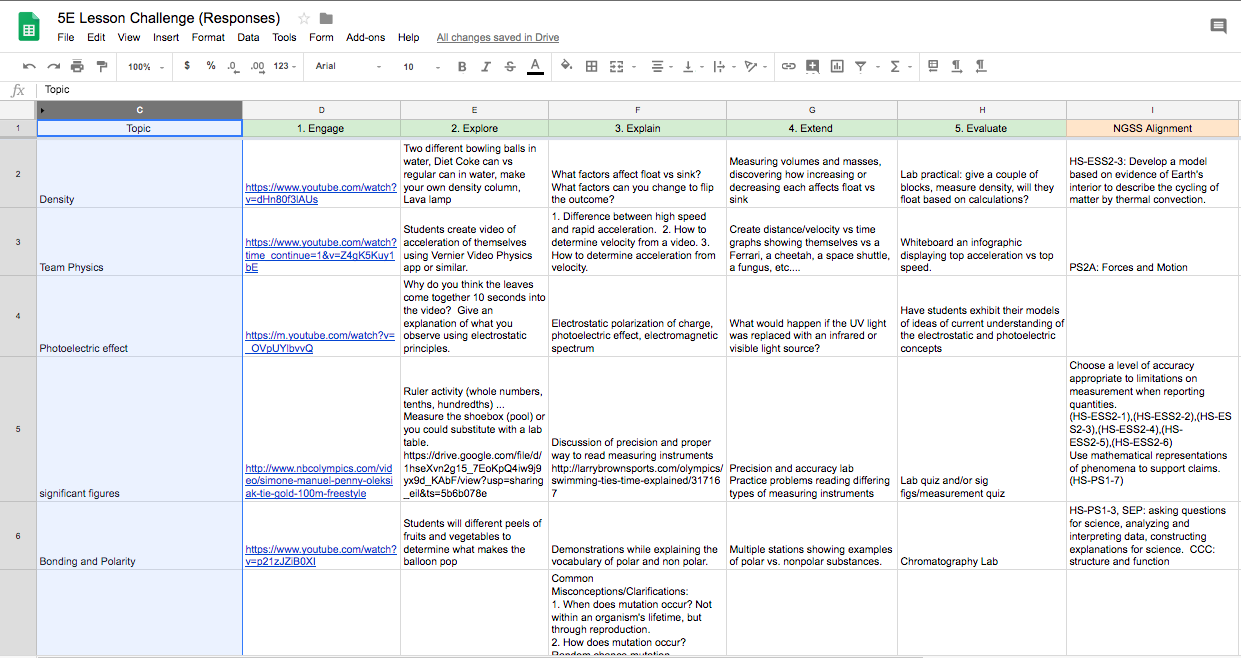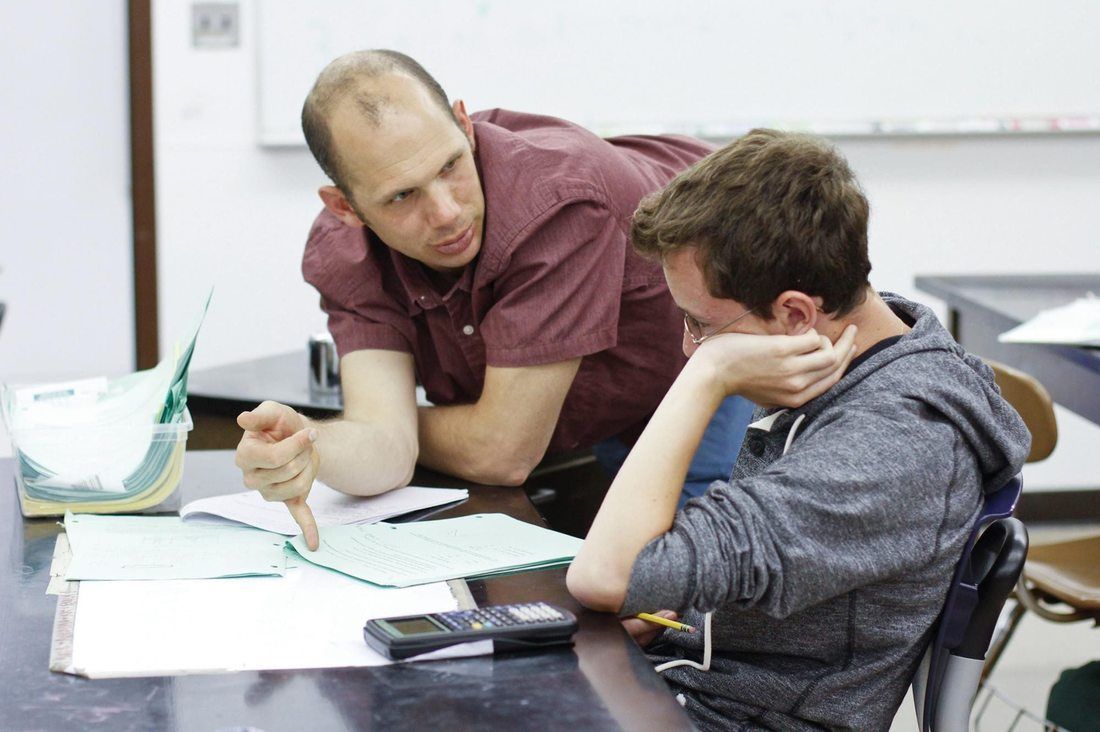|
|
|
I have written to annoying lengths about my love for the connection between the 5E Inquiry Learning Cycle and Joseph Campbell's Hero's Journey.
The below diagram outlines the serendipitous connections between these two cycles well:
In preparation for a professional development workshop I facilitated yesterday, I created a lesson planning template based on the above connection that I am very happy with.
My hope is to use a copy of the template for each cycle I create in my biology and chemistry classes for the upcoming semester. Unlike previous templates I have used, this one leverages a Google Slide template, as a planning, rather than presentation document. The flexibility of editing slides, embedding video, etc., makes Google Slides an incredibly flexible medium. You will notice that each of the five phase of the 5E/Hero's Journey cycle hyperlinks to an associated slide. I love this feature as it creates a contained pedagogical cycle, allowing the teacher to focus on each phase individually, IN THE CONTEXT OF THE WHOLE. As an educator, this connectivity is very comforting, and as Jon Stewart said: "A structure that allows for creativity". You will notice that each slide has two portions: 1) Lesson Procedure and 2) Technology integration. By "tagging" the technology on as an afterthought, this template forces the teacher to first think pedagogically (How does this procedure serve the inquiry cycle as a whole?), then procedurally (How will I make structure the class to accomplish the goal of the specific portion in the cycle?) and finally technologically (How can I leverage technology to make this lesson even more efficient, productive, meaningful, etc.?). Thus, technology serves the pedagogy by simply following the template. An ideal teaching tool IMO. Click here and "make a copy" of the template for your own use. The template is also embedded below for ease of viewing. Enjoy!
I have written in the past (click here and here) about my transition from formal lab reporting to the use of Google Slides as a student form of reporting lab work.
Today I sat down to begin the arduous process of finalizing all fall semester grades for my sophomore chemistry class and the benefit of using Google Slides their lab reporting format was clearly evident! My final "stack of papers" to grade was a shared folder full with our final lab practical reports: a group experiment where students determined the optimal H2-O2 ratio to fill a 2L bottle fo for maximum product upon ignition. Not only was I able to grade each project directly from my phone, but embedded video of procedures, screenshots of calculations, and clear images of laboratory procedures made for a meaningful assessment process. MORE IMPORTANTLY, the process of student creation and curation of their work using a Google Slide template (click here for the one used in this activity), was fluid, easy, and put the learning, rather than the reporting, at the forefront. Below is an embed of one group's "report". Before every major assessment I like to facilitate review activities in class. That being said, I can only handle the Kahoot theme song so much, play so many games of "Chemistry Jeopardy", or figure out another variation of Periodic Table Battleship to satisfy review of the whatever skills we are learning that topic.
Not that there is anything wrong with the above games, or the myriad of variations. Indeed, if I played Kahoot everyday my students would be STOKED! However, the above review games, in my mind, always fall short in one area: student creation/invention. This is where Google Forms is a powerful tool! During the past unit on Formula Analysis, distributed a different problem to each team of students. I then asked each of students to input their solution AND a Youtube video of them solving their problem on a whiteboard into a Google Form. I then made the output spreadsheet public, and students spent time solving one another's problems, and watching one another's solutions when they were stuck. Although not as superficially engaging as Kahoot, watching students invent videos to explain their problems, and negotiate not only the problem, but also how to teach it, was incredibly inspiring, and IMO, much more engaging from an outside perspective. Although this post is represents an extremely simple application of Google Forms, one I'm sure many of you have already done before or experimented with in the past, the power of immediately sharing the output formula with students, containing live links to the videos THEY created, was worth sharing. Click here for the Google Form and here for the output spreadsheet. See screenshots below as well. A few weeks ago I had the pleasure of working with the science educators at D211 in Chicago's Northwest Suburbs. As part of the workshop, all teachers were challenged to work in discipline specific teams to create an outline for an NGSS aligned, 5E Learning cycle. They were too good not to share! Click on the image below to access all lesson outlines. Enjoy!
In past years I always had students create either a blog or a website to publicly share their work and curate their progress. Click here for an example.
While I believe deeply in students archiving their work in a public space, after reading Show Your Work, an outstanding book by Austin Kleon, I began to put an incredible amount of pressure on myself to empower students to create beautiful space to showcase their work. In short, I lost track of the pedagogy, in replace for aesthetics. It's not Austin's fault. It's mine. Please read his book, it's hecka inspiring. I reflected on the lack of improved student metacognition despite my enhanced portfolio systems, and student comments such as "Do we have to do another portfolio post. I never look at it...". I began to ask myself: What really actually works? (in my classroom, with MY students). I remembered another comment from one student specifically: "Can we just put everything we did in this topic in a Google Slide presentation. It's SO much easier to include pictures and videos...". My initial reaction to this statement was one of hesitation. No way! Kleon calls us to share our work in a space we are proud of. Nobody is going to look at your Google Slides! Your work needs be in a beautiful website to be taken seriously! Again, aesthetics before pedagogy. Not a good choice. This year, I am putting down my tired attempts at doing what I think is the most "innovative" approach, and following my gut regarding what I feel and my students feel is the most impactful! I am taking my students advice. I created a Google Slide template for each unit, including spaces for students to link all of their major work (Labs, Case Studies, etc.) and a template for built in student reflection. Click here to access the Google Slide portfolio template, and click here to access our class website which will house "view only" version os the portfolios. Yes, not as beautiful as Weebly, SquareSpace, WIX, or even the NEW Google Sites. Ironically however, in just two days of class, I am already noticing a shift in student focus on the project at hand, and not where or how they report it. And...in the end...nothing is stopping us from embedding their Google Slides in a beautiful website. Wink. |
Categories
All
Archives
March 2024
|





 RSS Feed
RSS Feed